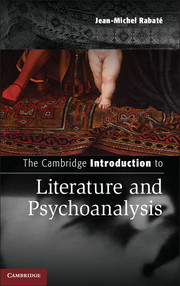Book contents
- Frontmatter
- Contents
- Acknowledgments
- Introduction
- Chapter 1 Freud’s theater of the unconscious
- Chapter 2 Literature and fantasy, toward a grammar of the subject
- Chapter 3 From the uncanny to the unhomely
- Chapter 4 Psychoanalysis and the paranoid critique of pure literature
- Chapter 5 The literary phallus, from Poe to Gide
- Chapter 6 A thing of beauty is a Freud forever
- Chapter 7 From the history of perversion to the trauma of history
- Conclusion
- Keywords and Index of Authors
- Bibliography
- Index
- References
Chapter 7 - From the history of perversion to the trauma of history
Published online by Cambridge University Press: 05 September 2014
- Frontmatter
- Contents
- Acknowledgments
- Introduction
- Chapter 1 Freud’s theater of the unconscious
- Chapter 2 Literature and fantasy, toward a grammar of the subject
- Chapter 3 From the uncanny to the unhomely
- Chapter 4 Psychoanalysis and the paranoid critique of pure literature
- Chapter 5 The literary phallus, from Poe to Gide
- Chapter 6 A thing of beauty is a Freud forever
- Chapter 7 From the history of perversion to the trauma of history
- Conclusion
- Keywords and Index of Authors
- Bibliography
- Index
- References
Summary
Borges famously equated universal history with the history of a few metaphors. In the slight difference between almost identical sentences beginning and ending “Pascal’s Sphere,” we see a whole world of doubt, subjective performativity and unconscious agency creeping in. Borges begins: “Perhaps universal history is the history of a few metaphors.” He ends: “Perhaps universal history is the history of the various intonations of a few metaphors”(SNF, pp. 351 and 353). Freud would not disagree: for him, universal history is the history of the various intonations of one metaphor, which is the primal murder of the Father of the horde, Freud’s pure myth on which the construction of the Oedipus legend rests. Could Freud write a universal history that would not be a “history of infamy” or “a history of iniquity”? How can one write a universal history if history is marked by a crime followed by concealment, forgetting, remorse, the election of a substitute for the murdered father, a better double with whom one can hope for atonement, and this at the very origin of historical time? This is the quandary in which Freud found himself at the outset of his most ambitious project, Moses and Monotheism, a book that that he planned as ein historischer Roman, his own “historical novel.” Besides the many problems posed by Freud’s radical thesis – Moses was not a Jew but an Egyptian, he was a high official and priest of Aton, whose monotheistic faith had been rejected by Pharaonic priests, and who, defeated in Egypt, started a religious experiment in the wilderness with a band of freed slaves who happened to be Jews – the very narrative implies an intense struggle with the deferred temporality of Nachträglichkeit.
- Type
- Chapter
- Information
- The Cambridge Introduction to Literature and Psychoanalysis , pp. 174 - 198Publisher: Cambridge University PressPrint publication year: 2014

